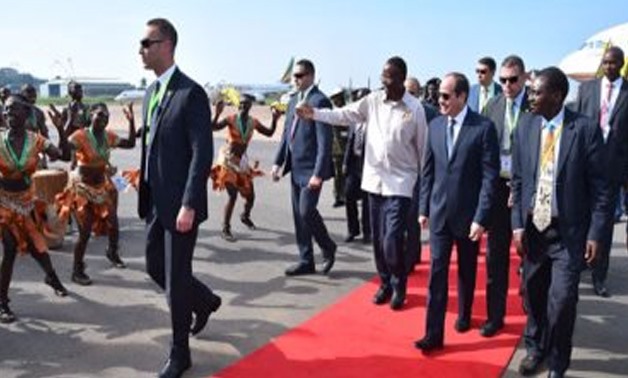
Egyptian President Abdel Fatah al-Sisi upon arrival in Entebbe airport
CAIRO – 22 June 2017: There have been ongoing conflicts over the Cooperation Framework Agreement (CFA), also known as ‘Entebbe Agreement’ since 2010. A summit organized by the Ugandan President Yoweri Museveni took place Thursday to reach common grounds and resolve conflicts among Nile Basin countries.
This is the first-ever summit held among Nile Basin countries, although it coincides with the 50th anniversary of the first cooperation between Nile Basin countries. However, the organization comprising all Nile Basin countries was formally formed in 1999 and is called the Nile Basin Initiative (NBI).
Entebbe Agreement
In May 2010, Nile Basin countries signed the Entebbe Agreement in order to replace the 1923 convention that awarded Egypt and Sudan shares of 55.5 and 18.5 billion cubic meters of water from the Nile per year respectively.
It is endorsed by six upstream countries; Ethiopia, Kenya, Uganda, Rwanda, Tanzania and Burundi.
Conflicts over the Agreement
Egypt froze its membership in the NBI in 2010 because of its objection of three articles in the agreement.
Egypt’s main objection is to Article 14 on water security. It consists of articles 14A and 14B. Article 14A states that Nile Basin countries agree “to work together to ensure that all states achieve and sustain water security.” Article 14B is about water quotas designated to each country.
Egypt also insists on making NBI decisions by unanimity and not by majority on the grounds that the upstream countries outnumber their downstream counterparts.
The article on prior notification is also debatable as Egypt insists on obliging upstream countries to notify downstream countries of any projects on the Nile in order to assess any potential harmful impact on their interests.
Prospective outcomes of NBI Summit
The summit agenda includes principles for administering Nile water, mutual cooperation mechanisms, water loss prevention mechanisms, and resuming cooperation projects.
There is a possibility that Egypt would reactivate its membership of NBI.
President’s speech in the summit
Egyptian President Abdel Fatah al-Sisi stipulated that infrastructure projects are a must on the river as only 84 billion cubic meters out of 1,600 billion cubic meters flow down to the waterway while the rest is wasted. Sisi clarified that 97 percent of Egypt’s water reliance comes from the Nile and that overpopulation decreased the individual’s annul share to 640 cubic meters.
Egypt suffers from a water deficit amounting to 21.5 billion cubic meters. The country manages to bridge it by recycling 80 percent of its water, which is amongst the highest rates in the world.
The president affirmed that Egyptian people are cautious against any act incurring any possible negative impact on Egypt’s water security.
Sisi stated that Egypt is participating in the summit to build trust with its fellow Nile Basin countries and to establish a mechanism for prior notification aligning with international standards to ensure transparency over projects built on the Nile river.
NBI is setting a development agenda to be completely executed by 2063 serving the 250 million people living on the Nile’s banks, called the 2063 Agenda.
Summit Meetings
Prior to the summit held in the Ugandan capital Kampala, heads of states and prime ministers of the Nile Basin countries held a closed session meeting in Entebbe, Uganda, with the participation of President Sisi who also held on the sidelines of the summit talks with Museveni over cooperation plans.
The summit included discussions over potential developmental projects in various sectors such as water resources management, agriculture, education, trade, health care, energy, and manufacturing

Comments
Leave a Comment